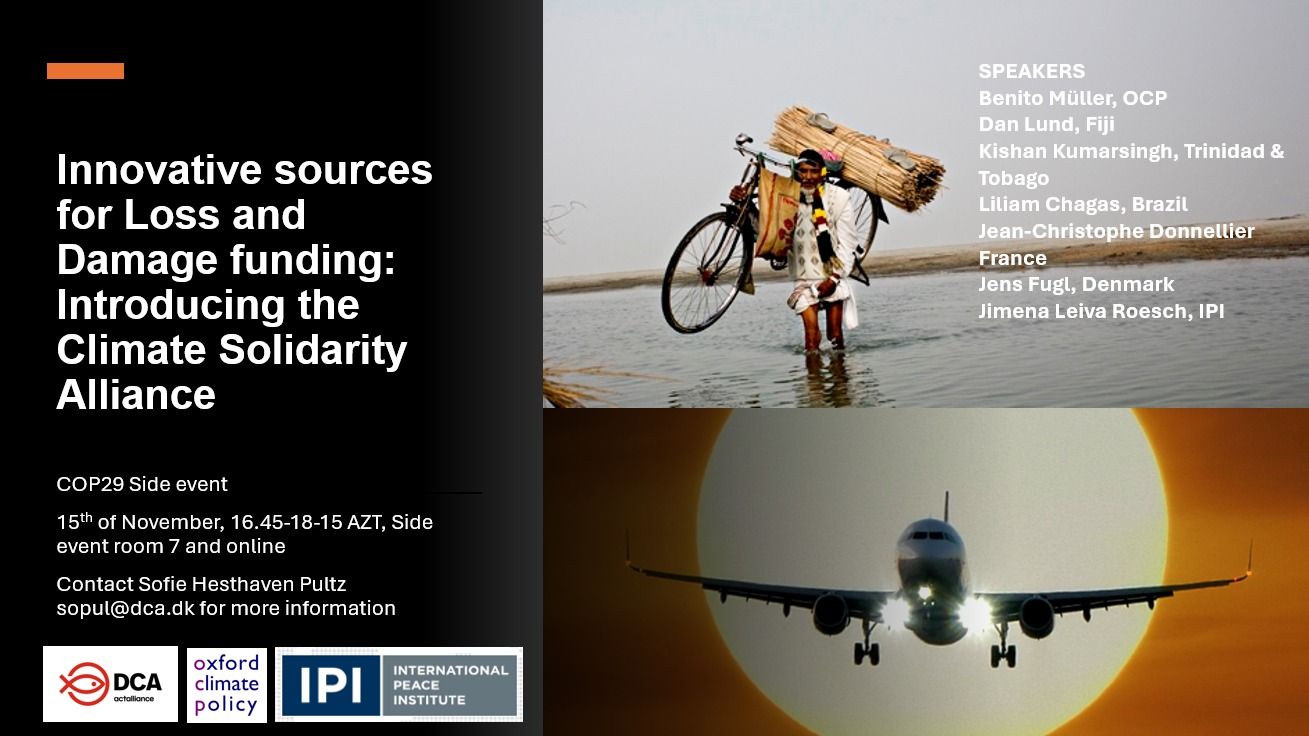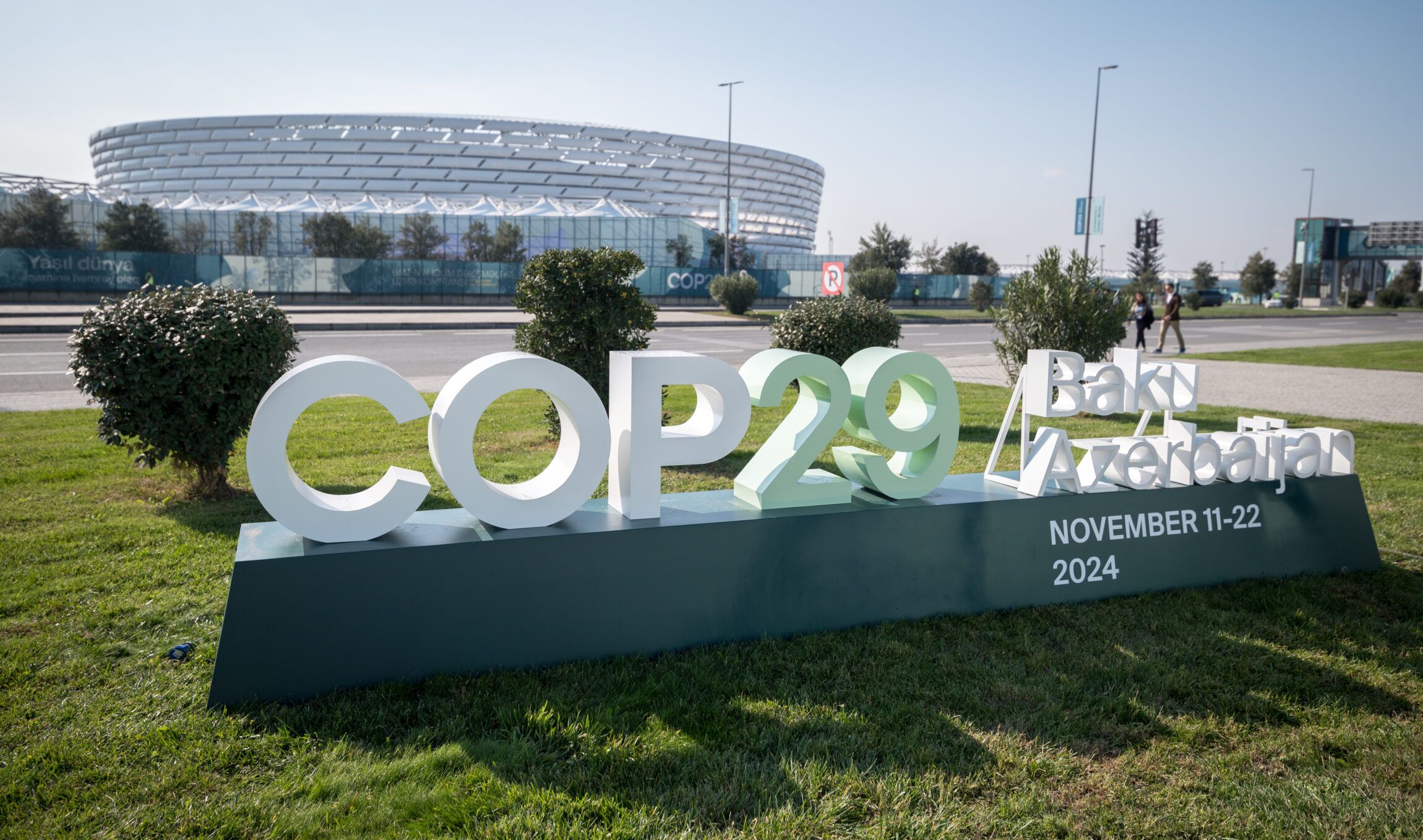Press Releases
Saturday 23rd November
COP29 secures scaled up climate finance but more finance is needed
At the UN climate summit, COP29, a NCQG agreement has been reached to allocate $300 billion USD annually from 2035 as climate finance to the Global South. However, the announcement of the adoption of the goal was met with protest statements from countries such as India, Bolivia, and Nigeria, who all rejected the NCQG document.
“The agreement is a step in the right direction, but the amount is far from sufficient to meet the vast needs we are already witnessing among our partners and country offices in the Global South,” says Jonas Nøddekær, Secretary General of DanChurchAid.
According to the annual UNEP’s Adaptation Gap Report, as much as $359 billion USD annually is required solely for climate adaptation. Beyond this, substantial funding is needed for the green transition and to address climate-related loss and damage.
“This clearly shows that current commitments are not enough to manage the climate crisis” Jonas Nøddekær emphasises.
Still, it is positive that the process remains alive and that there is a path forward, particularly with the mention of $1.3 trillion USD as a potential overarching goal or need.
Increased focus on adaptation funding is also acknowledged, but the financial gap highlighted by the Adaptation Gap Report is significantly larger.
“Every penny invested in climate adaptation makes a difference,” says Jonas Nøddekær. “But we cannot ignore the fact that inadequate support continues to leave the world’s most vulnerable countries in an unacceptably high-risk situation.”
It is, however, disappointing that loss and damage were not mentioned as a separate funding category. “People already experiencing irreversible losses due to climate change urgently need help. Their needs must not be ignored,” states Jonas Nøddekær.
COP29 has failed to deliver the necessary outcome to ensure sufficient support for the world’s poorest countries. “Of course, we are disappointed, but we will not give up the fight,” declares Jonas Nøddekær. “At DanChurchAid, we will continue working tirelessly to secure more funds and greater commitments so that the most vulnerable countries receive the support they need. We owe them that when climate change has largely been driven by us in the Global North.”
Although the agreement made in Baku will not be remembered as a major success, it remains important as it secures more funds to tackle the climate crisis. It also sends a crucial message to the world that international cooperation is necessary. “Now we hope countries will go home and follow up on the many promises. These must be translated into concrete allocations and actions,” says Jonas Nøddekær.
For questions, please contact the Global Climate Lead of DanChurchAid, Mattias Söderberg, msd@dca.dk +45 29700609
Thursday 21st November 2024
The COP29 Finance Agreement is Taking Shape: Has Adaptation Been Forgotten?
New text emerged early this morning. Viewed through the combined lens of adaptation and loss and damage, it is disappointing and deeply concerning.
Mattias Söderberg, Global Climate Lead at DanChurchAid, comments:
“Anyone with an understanding of the climate crisis knows how crucial adaptation is. Adaptation can save lives, communities, biodiversity, investments, and infrastructure. It is, therefore, hard to comprehend why it isn’t a top priority for all parties in the UN.”
Mattias continues:
“Do I sound frustrated? I hope so, because I am frustrated. When such an essential issue is not championed by all parties in discussions about future climate finance, someone has to speak up.”
The current text references the balance between adaptation and mitigation finance. This is the same language used in decisions about existing climate finance. However, the experience of recent years makes it clear: the focus has overwhelmingly been on mitigation. There is no indication that this focus will shift unless COP29 produces a strong outcome for adaptation finance.
Even more worrying is the treatment of loss and damage. Unlike adaptation and mitigation, it is not receiving equal consideration. While the text states that it should be “adequately addressed,” failure to recognise loss and damage as a distinct category means funding will likely be drawn from adaptation efforts. This would undermine adaptation initiatives, as funds would be redirected to address loss and damage. Furthermore, if adaptation and loss and damage are combined, these two critical needs would be forced to compete. As a result, people facing loss and damage might be left behind.
Mattias adds:
“Loss and damage must be recognised as a distinct element in the climate debate, with its own dedicated funding stream.
I hope these texts are revised and improved before adoption. In their current form, they do not represent a victory for the vulnerable people and communities of the world. They are a disappointment.”
Sunday 17th November 2024
COP29 Week One Update – Urgent Need for Ministerial Leadership to Unlock Progress
The first week of COP29 negotiations has concluded with minimal progress on critical issues, leaving an urgent need for bold ministerial leadership as negotiations enter their decisive second week. Despite a week of technical discussions, deep divisions persist, particularly around climate finance, adaptation, loss and damage, and mitigation efforts.
“We need bold leadership from our world leaders. This summit is far too important, we can not afford that it fails to deliver” says Global Climate Lead at DanChurch Aid, Mattias Söderberg.
Finance: Bridging the Divide
Finance has been a flashpoint of contention. The Global North is advocating for a broader base of contributors, while the Global South emphasises the need for finance mechanisms that address urgent climate impacts.
A recent report from the Independent High-Level Expert Group on Climate Finance underscores the urgency, highlighting that external finance from all sources – international public and private along with others – will need to cover $1 trillion USD per year of the total investment need by 2030 and around $1.3 trillion USD by 2035. This aligns with demands from the African Group (AGN) in negotiations.
“The climate finance bill is not just numbers – it represents the lives and futures of communities on the frontlines of climate change, who will be, and already are being, affected if finance isn’t flowing” Mattias Söderberg emphasised.
Adaptation and Loss & Damage: Progress Stalled
Adaptation and loss & damage have seen limited progress, despite promises from developed nations. As ministers step in, expectations are high for concrete commitments to support vulnerable nations in addressing the escalating impacts of climate change.
Despite promises to doubling adaptation finance, significant commitments remain absent. To date, only $61 million USD has been pledged from donor countries towards the Adaptation Fund. Far below its modest annual $300 million USD target.
“It is embarrassing that only 61 million USD was pledged for the Adaptation Fund. The Global North have promised to focus more on adaptation, and I hope this will be turned into commitments, when ministers arrive week two,“ says Mattias Söderberg.
Mitigation: Alarming Silence
Negotiations on mitigation have been alarmingly slow. One could assume that parties would address the root causes and reaffirm their commitment to reduce emissions and transition away from fossil fuels. But instead concerns grow over the lack of ambition to align national climate plans (NDCs) with the 1.5°C goal.
“The lack of progress is very disappointing. This summit should send a clear message that nations are serious about emissions reductions,” says Mattias Söderberg. “Instead, talks about mitigation have been slow, and it is very unclear what mitigation outcome we will have from this summit.”
Looking Ahead: Ministers to the Rescue?
The world’s eyes are on COP29 as ministers step in to take charge during the critical second week of negotiations. With discussions moving behind closed doors, hopes are pinned on their ability to resolve the stalemates that have defined week one.
Ministers are tasked with forging compromises on finance, adaptation, and mitigation, and must use their political influence to bridge entrenched divides. Achieving an ambitious outcome will demand genuine collaboration, with nations prepared to make compromises in the spirit of shared progress.
“COP29 must deliver bold and urgent action to address the escalating climate emergency. The stakes could not be higher – for vulnerable communities already facing climate impacts, for future generations, and for the health of our planet. The time to act is now,” says Mattias Söderberg.
Wednesday 13th November 2024
Finding the money for loss and damage – innovative solutions which can mobilise funding now
As the impacts of climate change intensify globally, finding innovative ways to finance responses to loss and damage has become more urgent than ever. Climate solidarity levies are one such innovative way.
Climate solidarity levies are targeted charges on high-emission sectors like aviation, shipping, and fossil fuels that can be created in various ways to fit different country contexts. Global Climate Lead of DanChurchAid, Mattias Söderberg, highlights that solidarity levies are a unique opportunity to raise reliable, dedicated funds for climate related loss and damage:
“National, and even subnational, solidarity levies can become a stable way to mobilise funding. This is an opportunity that we highly encourage our politicians to consider”
To showcase this funding opportunity, DanChurch Aid, Oxford Climate Policy (OCP) and International Peace Institute (IPI) will be co-hosting the COP29 side-event “Innovative Sources for Loss and Damage Funding: Introducing the Climate Solidarity Alliance” on 15th November 16:45-18:15 (AZT) in side-event room 7.
During this side-event, we will be exploring the role of climate solidarity levies as a potential solution for raising domestic funds and enhancing international collaboration. The event aims to inspire countries to implement these levies and show solidarity with the most vulnerable communities by allocating resources that specifically address the escalating costs of climate related loss and damage.
Mattias Söderberg comments:
“There is an urgent need to mobilise funds for efforts to address loss and damage. I hope initiatives like these can make a difference for people and communities facing the devastating effects of climate change”
At this event, DanChurch Aid, OCP, and IPI will also introduce the Climate Solidarity Alliance. This Alliance is developed to support the great work of the Global Solidarity Levies Task Force, a governmental initiative led by Kenya, France and Barbados, that was launched at COP28. The Alliance will support the Task Force’s mission to foster strong international collaboration on the creation and implementation of climate solidarity levies.
Mattias Söderberg, ends:
“The Global Solidarity Levy Task force is a great initiative, and we hope that our Alliance can help pave the way towards a stronger global collaboration build on solidarity with those affected by climate change”
The Side Event will take place in Side-Event Room 7 at COP29. For virtual participation, please find the event on the COP29 Virtual Platform.
For questions, please contact Mattias Söderberg, Global Climate Lead, DanChurchAid at msd@dca.dk or WhatsApp/Signal +45 29700609.
You will find more information about the event on this webpage: Innovative sources for Loss and Damage funding: Introducing the Climate Solidarity Alliance – DanChurchAid


